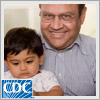Respiratory Syncytial Virus (RSV)
This program is presented by the Centers for Disease Control and Prevention.
[Karen Ngowe] Hi, I’m Karen Kanne Ngowe. Today I’m talking with CDC’s Dr. Eileen Schneider about RSV, a common cause of respiratory illness in young children. Thanks for joining me, Dr. Schneider.p>
[Dr. Schneider] Thank you for having me.
[Karen Ngowe] Dr. Schneider, what is RSV?
[Dr. Schneider] RSV stands for respiratory syncytial virus. It causes an infection that affects the lungs and breathing passages, and is very common. Most children will get it by the age of two, but you can get RSV infection at any age. You can also get infected more than once in your life.
[Karen Ngowe] What are the symptoms?
[Dr. Schneider] Many of the initial symptoms are similar to the common cold. Infants and young children may experience fever, lack of appetite, runny nose, coughing, or wheezing. In older children and adults, RSV infection is usually milder. Most people recover in a week or two.
[Karen Ngowe] Is it serious?
[Dr. Schneider] It can be. Some people develop severe lower respiratory tract illness from an RSV infection, such as pneumonia or bronchiolitis. Those who have a higher risk of severe illness include:
• Premature babies,
• Children younger than two years old with chronic lung or heart disease,
• Older adults, and
• People with weakened immune systems.
[Karen Ngowe] When should someone call the doctor?
[Dr. Schneider] When you’re having difficulty breathing, not drinking enough fluids, or if your symptoms are getting worse.
[Karen Ngowe] Is RSV contagious?
[Dr. Schneider] Yes, RSV spreads easily from person-to-person through coughing and sneezing.
You can also get infected with RSV by touching contaminated surfaces, such as toys or doorknobs, and then touching your eyes, nose, or mouth. Surfaces can become contaminated when an infected person touches them after sneezing or coughing into his or her hands, and surfaces can also become contaminated when droplets from an infected person’s cough or sneeze land on them.
Children often pass RSV to each other at school or at daycare and then spread the virus to family members. And people infected with RSV are usually contagious for several days, but some infants and people with weakened immune systems can be contagious for a few weeks.
[Karen Ngowe] Are there certain times of the year to watch out for?
[Dr. Schneider] In the United States, people typically get infected with RSV in the fall, winter, and spring. And it can vary somewhat, depending on where you live.
[Karen Ngowe] What can someone do to help protect themself and their family from getting infected?
[Dr. Schneider] There are a few simple tips that can protect you from RSV infection. These tips can also help prevent the spread of infection when you’re sick.
• Wash your hands often with soap and water for 20 seconds, and help young children do the same;
• Cover your mouth and nose with your arm, sleeve, or crook of the elbow when coughing or sneezing;
• Avoid touching your eyes, nose, and mouth with unwashed hands;
• Avoid close contact, such as kissing or sharing cups or eating utensils, with sick people; and
• Clean and disinfect frequently touched surfaces, such as toys or doorknobs, especially if someone is sick.
[Karen Ngowe] Is there a vaccine?
[Dr. Schneider] Currently there is no vaccine to protect against RSV. However, for young children at high risk for serious disease, a series of monthly shots of a drug called palivizumab may help prevent severe illness. If you think your child is at high risk, talk to your health care provider.
[Karen Ngowe] What is the recommended treatment for RSV?
[Dr. Schneider] Antibiotics aren’t used because RSV is a viral infection, and antibiotics treat bacterial infections. If you have a mild case of RSV, treat it like you would if you had a cold, and if symptoms persist, call your doctor.
[Karen Ngowe] Dr. Schneider, where can our listeners get more information about RSV?
[Dr. Schneider] There’s a lot of good information on CDC’s website at www.cdc.gov/rsv.
[Karen Ngowe] Thanks for your time today, Dr. Schneider.
[Dr. Schneider] My pleasure.
For the most accurate health information, visit www.cdc.gov, or call 1-800-CDC-INFO.



